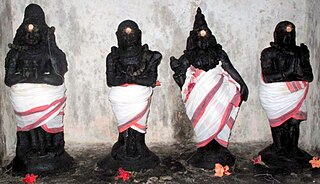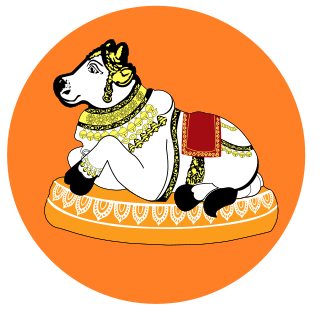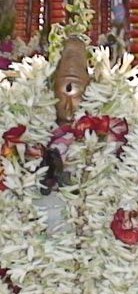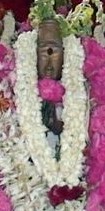
Thirumurai is a twelve volume compendium of songs or hymns in praise of Shiva in the Tamil language from the 6th to the 11th century by various poets in Tamil Nadu. Nambi Andar Nambi compiled the first seven volumes by Appar, Sampandhar and Sundarar as Tevaram during the 12th century. During the course of time, a strong necessity was felt by scholars to compile Saiva literature to accommodate other works. Tiruvasakam and Tirukovayar by Manickavasagar are included as the eighth, nine parts are compiled as the ninth Tirumurai out of which most are unknown, and the tenth as Tirumandiram by Tirumular, the famous Siddhar. The eleventh is compiled by Karaikal Ammaiyar, Cheraman Perumal and others. The contemporary Chola king was impressed by the work of Nambi and included Nambi's work in the eleventh Tirumurai. Sekkizhar's Periya Puranam, composed a century later, contains the life depiction of all the 63 Nayanmars. The response for the work was so tremendous among Saiva scholars and Kulothunga Chola II that it was included as the 12th Tirumurai. Tirumurai along with Vedas and Saiva agamas form the basis of Saiva Siddantha philosophy in Tamil Nadu.

Rajaraja I, born Arulmoli Varman, often described as Rajaraja the Great, was a Chola emperor chiefly remembered for reinstating the Chola power and ensuring its supremacy in south India and Indian Ocean.

The Periya Puranam, that is, the great purana or epic, sometimes called Tiruttontarpuranam, is a Tamil poetic account depicting the lives of the sixty-three Nayanars, the canonical poets of Tamil Shaivism. It was compiled during the 12th century by Sekkizhar. It provides evidence of trade with West Asia The Periya Puranam is part of the corpus of Shaiva canonical works.

Manakanchara Nayanar, also known as Manakkanychaara Nayanar, Manakkancharar, Manakanjara Nayanar, Mankkanjara Nayanar and Manakkanjarar, was a Nayanar saint, venerated in the Hindu sect of Shaivism. He is generally counted as the twelfth in the list of 63 Nayanars. Like other Nayanars, he was a fervent devotee of the god Shiva. Manakanchara Nayanar is dated to the 8th century and was a contemporary of Eyarkon Kalikkama Nayanar, a Nayanar saint and his son-in-law as well as Sundarar. He is described to have cut his daughter's hair and given it to Shiva disguised as a Shaiva ascetic, on her wedding day.

Kotpuli, also known as Kotpuliyar and Kotpuli Nayanar, was a Nayanar saint, venerated in the Hindu sect of Shaivism. He is generally counted as the fifty-seventh in the list of 63 Nayanars.

Vedaranyeswarar Temple is a temple dedicated to Shiva, located in the town of Vedaranyam in Tamil Nadu, India. Vedaranyeswarar is revered in the 7th century Tamil Shaiva canonical work, the Tevaram, written by Tamil saint poets known as the nayanars and classified as Paadal Petra Sthalam. It is the only temple to have found mention in all the seven Thirumurais. The temple is famed for the legend between Appar and Sambandar when the former sang to open the door while the latter sang to close the door.
Yenathinathar, also known as Yenatinata, Yenathi Nayanar, Yenadhinatha, Yenadinath, Yenadinatha Nayanar and Yenadhinatha Nayanar, was a Nayanar saint hailing from Eezha clan, venerated in the Hindu sect of Shaivism. He is generally counted as the ninth in the list of 63 Nayanars.
Kalikamba Nayanar, known as Kalikkamba, Kalikamba, Kalikambar, Kaliyamba, Kalikkambar, Kalikkampa(r), Kali Kambanar, Kalikkampa Nayanar and Kaliyamba Nayanar(u), is a Nayanar saint, venerated in the Hindu sect of Shaivism. He is generally counted as the forty-third in the list of 63 Nayanars. His hagiography speaks about how he cut the hand of his wife, who did not help in serving a Shaiva, devotee of the god Shiva.
Satti Nayanar, also known as Satti (Sathi), Sathiyar, Shakti Nayanar, Shakti, Shaktiyar (Saktiyar), Sattiyandar and Thiru-Saththi Nayanar, is a Nayanar saint, venerated in the Hindu sect of Shaivism. He is generally counted as the 45th in the list of 63 Nayanars. Satti Nayanar is described to cut off the tongue of whoever talked ill of his patron god Shiva or Shiva's devotees.
Kungiliya Kalaya Nayanar, also known as Kungiliya Kalaya, Kalayar, Kunguliya and Kalaya Nayanar, is a Nayanar saint, venerated in the Hindu sect of Shaivism. He is generally counted as the eleventh in the list of 63 Nayanars.

Murthi Nayanar, also spelt as Murthy Nayanar, Moorthy Nayanar and Murti Nayanar and also known as Murtti, is a Nayanar saint, venerated in the Hindu sect of Shaivism. He is generally counted as the fifteenth in the list of 63 Nayanars.

Murkha Nayanar, also known as Moorka Nayanar, Murka Nayanar, Moorkha Nayanar, Murgga Nayanar, Moorkka Nayanar and Murkhar, is a Nayanar saint, venerated in the Hindu sect of Shaivism. He is generally counted as the thirty-second in the list of 63 Nayanars.

Isaignaniyar, also spelt as Isainaniyar, Isaignaniyaar, Isaignaniar and Isaijnaniyar and also known as Isai-jnani Ammaiyar, is the mother of Sundarar, one of the most prominent Nayanar saints. She is herself regarded as a Nayanar saint, venerated in the Hindu sect of Shaivism, along with her husband Sadaiya Nayanar. She is generally counted as the last in the list of 63 Nayanars.

Sadaiya Nayanar - 7th century, also known as Sadaya Nayanar, Sadaiyan (Cataiyan), Sadaiyanar (Cataiyanar) is the father of Sundarar, one of the most prominent Nayanar saints. He is himself regarded as a Nayanar saint, venerated in the Hindu sect of Shaivism, along with his wife Isaignaniyar. He is generally counted as the sixty-second in the list of 63 Nayanars, Isaignaniyar being the last Nayanar. Sundarar is the only Nayanar with both his parents enlisted as Nayanars. The inclusion of Sadaiya Nayanar, streams solely on the basis on his association with Sundarar, rather than individual merit.
Eyarkon Kalikkama Nayanar, also known as Eyarkon Kalikama Nayanar, Kalikkama Nayanar, Kalikamba Nayanar, Kalikkamar, Kalikamar, Kalikkambar, Yeyarkon Kalikkamar and Eyarkon Kalikkamar, is a Nayanar saint, venerated in the Hindu sect of Shaivism. He is generally counted as the twenty-ninth in the list of 63 Nayanars.

Pugal Chola, also known as Pukal Chola, Pukazhchozha Nayanar, Pugazh, Pukazhcchozhar, Pukal Cholan and Pugal Chola Nayanar, is described as a Chola ruler and was a Nayanar saint, venerated in the Hindu sect of Shaivism. He is generally counted as the eighth in the list of 63 Nayanars.

Sirappuli Nayanar, also known as Sirappuli, Sirapuli Nayanar, Sirappuliyar (Chirappuliyar), was a Nayanar saint, venerated in the Hindu sect of Shaivism. He is generally counted as the thirty-fifth in the list of 63 Nayanars. Sirappuli Nayanar is described to have served the devotees of the god Shiva and worshipped the god with various ritual practices.
Amaraneedi Nayanar, also known as Amarneethi (Nayanar), Amarneeti (Nayanar), Amarniti (Nayanar), Amar-Nidhi (Nayanar) and Amarneethiyar, was a Nayanar saint, venerated in the Hindu sect of Shaivism. He is generally counted as the seventh in the list of 63 Nayanars.

Kutruva Nayanar, also known as Kootruva , Kutruva, Kutruvar, Kootruvar, Kurruva Nayanar, Kurruvar, Kurruvan, Kutruvanar, Kurrrruvar, Kalappallan and Kalappalar, was a chieftain of Kalandai and a Nayanar saint, venerated in the Hindu sect of Shaivism. He is generally counted as the 39th in the list of 63 Nayanars. Kutruva is often described as a Jain, who became a devotee of Shiva, the patron god of Shaivism.
Meiporul Nayanar known as Meypporul Nayanar, Meipporul (Meypporul), Meiporular, Meypporular, Maiporul Nayanar and Miladudaiyar is a Nayanar saint, venerated in the Hindu sect of Shaivism. He is generally counted as the fifth in the list of 63 Nayanars.







